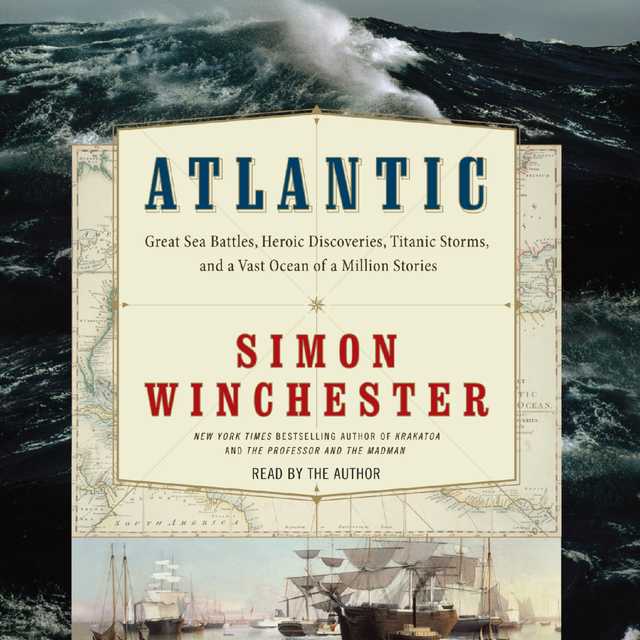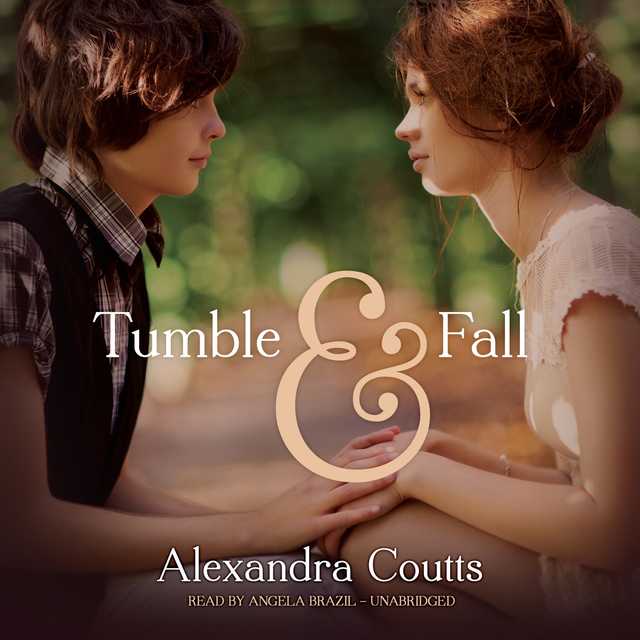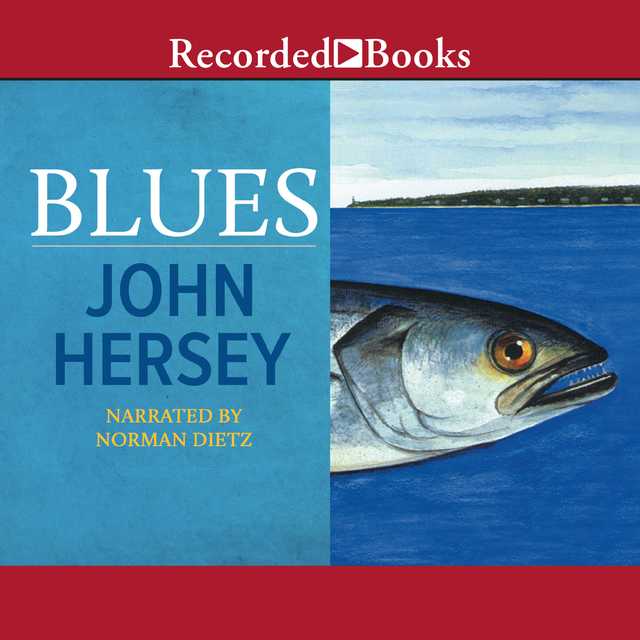Atlantic Audiobook Summary
“Variably genial, cautionary, lyrical, admonitory, terrifying, horrifying and inspiring…A lifetime of thought, travel, reading, imagination and memory inform this affecting account.” —Kirkus Reviews (starred review)
Blending history and anecdote, geography and reminiscence, science and exposition, New York Times bestselling author Simon Winchester tells the breathtaking saga of the Atlantic Ocean. A gifted storyteller and consummate historian, Winchester sets the great blue sea’s epic narrative against the backdrop of mankind’s intellectual evolution, telling not only the story of an ocean, but the story of civilization. Fans of Winchester’s Krakatoa, The Man Who Loved China, and The Professor and the Madman will love this masterful, penetrating, and resonant tale of humanity finding its way across the ocean of history.
Other Top Audiobooks
Atlantic Audiobook Narrator
Simon Winchester is the narrator of Atlantic audiobook that was written by Simon Winchester
About the Author(s) of Atlantic
Simon Winchester is the author of Atlantic
More From the Same
- Publisher : HarperAudio
- Abraham
- American Gods [TV Tie-In]
- Dead Ringer
- House of Sand and Fog
- Prey
Atlantic Full Details
| Narrator | Simon Winchester |
| Length | 14 hours 30 minutes |
| Author | Simon Winchester |
| Category | |
| Publisher | HarperAudio |
| Release date | November 02, 2010 |
| ISBN | 9780062007124 |
Additional info
The publisher of the Atlantic is HarperAudio. The imprint is HarperAudio. It is supplied by HarperAudio. The ISBN-13 is 9780062007124.
Global Availability
This book is only available in the United States.
Goodreads Reviews
Will
December 04, 2013
Using as his central pillar a Shakespearean monologue from As You Like It that lists the seven stages of a man’s life, Simon Winchester offers us the life of an ocean. He covers a very wide swath in his examination of that very un-pacific Atlantic. Beginning with big-picture geology, he looks at the infant Atlantic and gives a preview of what the world will look like when the Atlantic is no more. There is plenty here about tectonics, volcanism and the mighty forces of a planet that is constantly changing. But his primary focus in on the relationship of people to the Atlantic. He looks at a host of firsts across many disciplines, the first to cross the ocean, the first paintings centered on the ocean, the first poems, stories, etc. He tells how Islamic control of both ends of the Mediterranean contributed to European expansion across the less contested Atlantic, round about 1492. Much attention is paid to the Atlantic as an arena for battle, from the earliest seagoing battles to contemporary submarine warfare, with a surprising entry here on the importance of chestnuts to munitions manufacture, and of how technical expertise re weapons production influenced the creation of a state decades later. He looks at how trade became a basis for 11th and 12century globalization, traces the development of commercial oceanic trade, and brings it all up to date with a look at current Atlantic traffic, both asea and aloft. He offers a look at some of the ecological implications of that commerce, and notes new technologies that hopefully will mitigate, somewhat, the harm that commerce causes. He also looks at the impact of overfishing.Atlantic is not a fast read. I suppose that is because of the huge quantity of facts presented. But it is well worth the time.Some might argue that Winchester has over-reached, that such a globe-girdling tale cannot truly be distilled into a meager 459 pages. (the page count in my pre-release copy may not match the final number) Perhaps the subject is too large for a single volume. But do not be dissuaded by this. Winchester has put together a vast array of fascinating material, diving deep to find bits information that will surprise and please. Winchester’s Atlantic covers many aspects of the great ocean, which seems fitting when one considers the reach of the ocean itself. I had the pleasure recently of being at a lake in Montana that spreads its waters in three directions, one of which is towards the Atlantic. How remarkable the reach of this vast body of water. What a titanic (couldn’t resist) achievement that Winchester has offered us all an opportunity to recognize just how important this body of water is to humanity, to our survival, to our history, to our politics, to our culture, to our art, to our very identity and to our future. The Atlantic Ocean only has another 170 million years before it succumbs to the demands of geology and perishes. So there is not a minute to spare. Swim out to your store and pick up a copy while there is still time. =============================EXTRA STUFF11/25/13 – My GR pal, Cathy D sent along this link to a fascinating article that concerns the Big A. Seems a large object dropped in on us at what is now the Chesapeake Bay and scientists recently found an explanation for some heretofore inexplicable inland water that was unusually salty.
Brian
October 27, 2020
Winchester has had a lifetime of Atlantic crossings, and can weave his personal accounts in with those of vast numbers of other voyagers down the centuries. It's a rambling and enthusiastic book, full of historical lore and incredibly detailed vocabulary. It features the drama of geological plate tectonics, but mostly focuses on Western man, especially English man, at sea. There's the early explorers, the seaside cities, the naval wars, and commercial advances. Only late in the book does Winchester look seriously at the life within the sea. He never gets really oceanographical, and includes no accounts of undersea explorers. Still, the accounts of overfishing and global warming are gripping. Maybe the best part is the fascinating and informative but admittedly speculative writing on how the seas may be changing -- chemically, biologically, and climatically. Always the concern is on how humans and the ocean affect each other's lives. Winchester's conviction that the Atlantic is at the core of human history is Eurocentric, but his appreciation for the sea's majesty is pretty universal.
David
January 22, 2011
This is a very enjoyable book; it covers many aspects of the Atlantic Ocean. The book describes its formation and its ultimate end, exploration, the use of the ocean for commerce, for food, for battles, and the inspiration the ocean has for literature, art and music. And of course, the book contains some stories of shipwrecks and of the ecological damage that people have inflicted on the ocean. Unlike some of the other reviews, I found this book to be an easy read. Winchester writes in a delightful, literary, almost poetic style. The physical book itself is quite attractive; the newly designed attractive typeface took me by surprise. (Some more editing is needed--there are quite a few typos.) There are plenty of small, black-and-white illustrations that add to the stories.
Jim
February 03, 2020
Basically a collection of essays on the Atlantic, wide ranging and interesting, that covers things such as history, oceanography, literature, environment, seafaring, and a host of other topics. Winchester is a good writer and this is a nice addition to his bib. Surprisingly, most of the information I was pretty much familiar with, but there was still a lot of new things and refreshers, as well.
J.R.
October 11, 2016
"One cannot but hang one's head in shame and abject frustration. We pollute the sea, we plunder the sea, we disdain the sea, we dishonor the sea that appears like a mere expanse of hammered pewter as we fly over it in our air-polluting planes--forgetting or ignoring all the while that the sea is the source of all the life on earth, the wellspring of us all."That environmental theme pops up quite a bit in the narrative of Simon Winchester's "Atlantic: Great Sea Battles, Heroic Discoveries, Titanic storms, and a Vast Ocean of a Million Stories."Winchester set out to write a book explaining all there is to know about the Atlantic, which he considers to be our most important ocean. An overwhelming task and one might doubt it's even possible. He may not have succeeded in his initial goal but he comes as close as anyone in writing a biography of our ocean.He explains how the ocean was born, how people living on its shores reacted to it and how, most importantly, it has influenced the development of the civilized world. To do this, he tells tales of man's first attempts to go out on the water, pirates, naval battles, the development of sea-going commerce and other topics. He also includes numerous anecdotes from his personal experience with the ocean.He fears for our future if we don't change and start treating our environment like a home and not a garbage pit.I'm not opposed to space exploration. It has resulted in many benefits for mankind. Still, I wish just a portion of the money and the interest could be directed toward oceanography. This is the planet on which we live. I have no desire to go live on a barren rock where there's no other forms of life.
Patrizia
September 06, 2018
Le prime pagine di Atlantico bastano per mostrarci l’impresa titanica che l’autore vuole affrontare. Per raccontarci dell’Oceano Atlantico da un punto di vista geografico e antropico, Simon Winchester arriva a scomodare addirittura il Bardo: infatti, è solo grazie a Shakespeare che riesce a trovare una cornice adatta ad accogliere il suo immenso lavoro. Si tratta di una celebre pagina dell’As you like it del Bardo in cui la vita dell’uomo viene ripartita e raccontata in sette grandi età: «Prima, l'infante che miagola e vomita in braccio alla nutrice. Lo scolaro poi, piagnucoloso, la sua brava cartella, la faccia rilucente nel mattino, che assai malvolentieri striscia verso la scuola a passo di lumaca. E poi l'innamorato, che ti sospira come una fornace, e in tasca una ballata tutta lacrime sopra le ciglia della sua adorata. Poi, un soldato, armato dei moccoli più strambi, un leopardo baffuto geloso dell'onore, lesto di mano, pronto a veder rosso, che va a cercar la bubbola della reputazione persino sulla bocca d'un obice. E poi il giudice, con un bel ventre tondo, farcito di capponi, occhio severo, barba ritagliata a regola d'arte, gonfio di sentenze e di luoghi comuni: e in questo modo recita la sua parte. L'età sesta ti muta l'uomo in magro pantalone in ciabatte, le lenti al naso, la borsa sul fianco, e quelle braghe usate da ragazzo, ben tenute ma ormai spaziose come il mondo per i suoi stinchi rattrappiti, e il suo vocione da maschiaccio che ridiventa un falsetto infantile, un suono fesso e fischiante. L'ultima scena infine, a chiuder questa storia strana, piena di eventi, è la seconda infanzia, il mero oblio, senza denti, senz'occhi o gusto, senza niente».É così che Winchester prova ad abbracciare l’Oceano e la sua storia, a cominciare da 195 milioni di anni fa, quando Pangea inizia ad aprirsi e Panthalassa (l’unico elemento acqueo del globo) si infila lentamente tra la futura Europa e la futura America. Dopo milioni di anni di eruzioni vulcaniche, assestamenti violenti, terremoti, lava e quant’altro comincerà a delinearsi una prima forma di Oceano Atlantico.In questo modo comincia a legarsi inevitabilmente la storia dell’uomo a quella dell’Oceano più percorso al mondo. Leggiamo delle allusioni mitologiche al gran mare che si apre oltre le colonne d’Ercole e delle prime esplorazioni atlantiche dei Fenici, delle straordinarie imprese dei Vichinghi e dei Norreni e il loro approdo, a bordo di minuscole imbarcazioni chiamate knaar, nel nord di quel continente che, solo secoli dopo, Colombo avrebbe pensato di scoprire per primo (in realtà, pare, fu Leif Erikson, islandese, ad approdare per primo sulle coste di Terranova).Leggere gli aneddoti che cita Winchester lascia tramortiti e in perenne stato di angoscia: l’uomo altro non è che un’inezia, una minima parte della vita di questa immensa distesa d’acqua. Anche perché l’Oceano di per sé, e soprattutto l’Atlantico, ci viene dipinto come sinonimo di turbolenza, di tempesta, di difficoltà, di imprese fallite, di potenza naturale, di imperscrutabilità. Di costante impossibilità dell’uomo di dominare una tale forza naturale. Tuttavia, è stato proprio l’Atlantico a dare il via alle ambizioni di esploratori, scienziati, guerrieri, poeti, pescatori e marinai, spingendoli al di là del limite conosciuto. Dai Fenici che navigarono fino al Marocco per pescare i murici, da cui ricavavano la porpora, ai Vichinghi, che scoprirono Terranova prima di tutti; dai portoghesi che arrivarono per primi in America Centrale e Meridionale, ai primi vascelli a vapore e ai primi U-Boot; dalle navi piene di pirati a quelle piene di schiavi; dalle prime battaglie tra navi corazzate, alle traversate in solitario; dal Titanic all’uragano Katrina. Come ogni terra emersa, anche l’Atlantico è sfondo di morte come è sfondo di vita. Così dalle esplorazioni e dalle guerre si passa ai commerci, alle comunicazioni, alle scoperte, per approdare infine alla devastazione dell’inquinamento, alla pesca distruttiva, alla scomparsa di intere specie ittiche, allo scioglimento dei ghiacci, all’incubo del petrolio.Questo e molto di più affronta Winchester nel suo meraviglioso affresco che combina assieme il suo personale amore per l’Oceano Atlantico con la storia dell’uomo, inestricabilmente legata ad esso. Moltissimi aneddoti, decine e decine di storie, che convergono tutte verso la più importante, l’ultima. Quella che è già cominciata, che è tutt’ora in corso e che lo sarà per circa 200 milioni di anni ancora: perché tutti gli tsunami, tutti gli uragani, tutte le eruzioni, non sono che un’inezia di fronte a quello che succederà quando inevitabilmente i continenti oggi divisi torneranno ad essere un tutt’uno. Ci saranno spostamenti tettonici chilometrici e devastanti. Questo avverrà a prescindere dalla volontà dell'uomo: la terra ha una data di scadenza anche tralasciando le nefandezze che l’umanità riversa in natura e nell’Oceano in particolare. Le tempeste aumentano di intensità e forza, le correnti cambiano di percorso in maniera autonoma: tutto ci spinge a pensare che questo cambiamento sia inevitabile. Indubbiamente questa non è una giustificazione per tutto ciò che di malsano l’uomo compie nei confronti dell’habitat in cui vive, ma se questo acceleri il processo ciclico che porterà tutto allo stato iniziale è materia di dibattito incessante.
Deborah
February 13, 2016
This was a very enjoyable book and I am very glad that I took Will’s recommendation and bought it sight unseen. I am pretty sure I will both re-read it and use it as a reference in future.The book is kind of a biography of the Atlantic Ocean as seen by mankind. There is a brief introduction to its formation and information about its habits, tides, winds and other quirks are scattered throughout the book. The narrative is easy, familiar and personalised, I do not recall ever having read anything by this author before but his style is very readable and the book is peppered with personal experiences and recollections of his lifelong, ongoing relationship with the Atlantic Ocean.The Atlantic is not a fast read at all it has taken me a couple of months to get through it. This is not a bad thing, it is because it is very full of information so that I have to be in the right frame of mind to sit down and read it for any length of time. The other thing is that it keeps waving enticing sidetracks of information under the reader’s nose; thus it was that I found myself googling early Atlantic oriented prose, narwhals and other misc after reading for a while.Criticisms of this book, I always have some after all; The early human civilisation and expansion to the West are well covered. However after America is firmly settled it turns into less of an ‘Atlantic Ocean’ book and more of an “American Atlantic’ book. You get this with American authors, they get America-centric, one just grimaces and bears it but I do feel that a couple of chapters wandered off into American internal affairs too much. The other thing I didn’t like was how very Atlantic-centric, it was. Perhaps not surprising given the title of the book. I am however a Pacific Ocean ‘gal and I can’t get on board the notion that the Atlantic is the only ‘real’ Ocean. For example “... the Atlantic Ocean will still be the centre of the human word.” [pgs 20-21], no dude, for people living on it, yes, however not all, or even most, people do live on the Atlantic. And another “...the sea –level problem is first and foremost an Atlantic problem...” [pg 411] What now? No, really, just... no! Again, Americans, we just grin and bear them.These small problems are redeemed in the last couple of chapters where ecological issued are presented, and the epilogue describing the geological future of the Atlantic is a graceful and poetic ending to a book I put down with the sense of a book well read.
Jack
March 28, 2014
Reading Simon Winchester Simon Winchester is like sitting down at a banquet with an historian, a geologist, a linguist, a meteorologist, a geographer, a novelist, and a world traveler. You're going to hear incredible stories about world events and adventures that will remain with you as long as you live. Winchester was an Oxford-educated geologist before he became a journalist and prolific author of books about fascinating topics: the history of the first geological map; an Oxford scholar who wrote a multi-volume history of science in China; the professor who wrote the Oxford English Dictionary; the cataclysmic 1883 Krakatoa volcano eruption; and the 1960 San Francisco earthquake. No topic is too large or all encompassing for Winchester. Who else would have the courage and energy to write a book about -- the Atlantic Ocean? A history that starts in Cambrian times, 500 million years ago, to the break up of the mega-continental Pangea 200 million years ago when a span of water we know as the Atlantic began expanding between what became the American and European continents. Any history book is about people who explore or make discoveries. In Atlantic Atlantic: Great Sea Battles, Heroic Discoveries, Titanic Storms & a Vast Ocean of a Million Stories, Winchester writes about Leif Eriksson, John Cabot, Christopher Columbus, Ferdinand Magellan, Ponce de Leon, Rudyard Kipling, Guglielmo Marconi, Samuel Morse, and Thomas Edison. But Winchester isn't focused only on the famous names of the past; he shares anecdotes about little-known or long-forgotten heroes such as Angus Campbell Macintyre whose memorial he found on the Skeleton Coast off Namibia. Winchester dedicated his book to Scotsman Macintyre who died trying to rescue sailers on the shipwrecked SS Dunedin Star in 1942.Fittingly, Winchester ends his book by telling us when the Atlantic Ocean will be no more. He says in 170 million years, tectonic forces will push the southern tip of South America and connect to Antarctica then head northward and collide with the tip of the Malay peninsula near Singapore.
Matt
July 10, 2016
People have critiqued the sprawling nature of this book, but such a nature seems fitting for a book on something as large (geographically, historically, geologically) as the Atlantic Ocean. Besides, overall he groups his material into considering the Atlantic from various angles: geological, exploration history, commercial history, military history, and environmental impact. I listened to this book as an audiobook, and it was simply a pleasure to have Winchester in my car for several weeks, telling me what he knows about the Atlantic.One of the lasting impressions this book made upon me is his discussion of the geological span of the Atlantic, namely that even though it began a long time ago and will last long into the future, the Atlantic is temporal and short-lived in comparison to the planet. And thus humans are just a blip in the history of the Atlantic Ocean, which is itself just one chapter in the history of the Earth. Such a perspective properly situates the human race, as well as casts a dramatic lens on the impact we are having on the ocean (overfishing, global warming & rising sea levels, water-borne pollution, etc.). Still, the Atlantic and the Earth will carry on long after humans; but the return to homeostasis of the planet may eliminate humans in the process. I think Winchester was just trying to be judicious about the evidence for global warming, but at points he comes across as skeptical about what is a well-established scientific fact.This is a fascinating, intricate book, and highly-recommended!
Kevan
November 28, 2013
This is a biography of the Atlantic ocean. It tells of the story of every major event that has ever taken place on the sea. We get to learn about the early days of exploration by ship, of development of the the slave trade, of the sinking of the Titanic, of naval warfare, of maritime trade, of the laying of the first transatlantic cable, the rise and fall of the Grand Banks fishery, the explosion at Halifax, the first days of cross-ocean flight, and dozens more amazing stories and periods of time. I would often find myself trying to memorize the many mini-stories in these pages so I could retell them later ("Do you know Chaim Weizmann, who came up with the chesnuts solution for creating acetate and ended up introducing Britain to Zionism??") This book was amazing -- I would say, though, it's about as inviting as a bodyguard. I almost gave up on this book at the 1/4 mark, its prose is so thick and daunting. But if you end up being let past the gate, the rest of the book is incredibly rewarding, brilliant, enchanting.
Phil
August 26, 2021
I've come to enjoy Winchester's writing such that I'll pick up a book of his if it's a bargain. That's what happened here, finding this nice hardcover for $9.99 (CAD!) at Master's Bookstore in Haliburton, Ontario. A whole big book (400+ pages!) about.. the Atlantic ocean? Sure! That's what vacation is for, and that serendipity of selection is part of the pleasure of reading.I really enjoyed this book. Being quite ignorant about the ocean, I learned a lot. Winchester has ample experience on the ocean, so this book is not simply a history, nor is it simply information, nor is it merely a narrative, nor a travelogue. It is all of these things. The book is organized interestingly along the seven divisions of a human lifespan described so memorably by Shakespeare in As You Like It: All the world's a stage,And all the men and women merely players;They have their exits and their entrances,And one man in his time plays many parts,His acts being seven ages. At first, the infant,Mewling and puking in the nurse's arms.Then the whining schoolboy, with his satchelAnd shining morning face, creeping like snailUnwillingly to school. And on it goes through life until old age and death. Using this rough framework, the author describes the lifespan of not only the ocean itself but mankind's relationship to it. I thought it worked pretty well as a way to organize the work. Within these long chapters was a meandering series of anecdotes, history, personal experience, information, and more. The ability of Winchester as a writer is what carries the reader through to the end. The only parts I didn't enjoy as much were the beginning and the end... that is, the prehistoric retelling of the ocean's origins and its far-flung future. It was all too speculative for me to take all that seriously. But he gets points for taking a pretty even-handed approach to the whole question of climate. All in all, glad to have read it, and happy to recommend it to anyone with a curious mind.
Frequently asked questions
Listening to audiobooks not only easy, it is also very convenient. You can listen to audiobooks on almost every device. From your laptop to your smart phone or even a smart speaker like Apple HomePod or even Alexa. Here’s how you can get started listening to audiobooks.
- 1. Download your favorite audiobook app such as Speechify.
- 2. Sign up for an account.
- 3. Browse the library for the best audiobooks and select the first one for free
- 4. Download the audiobook file to your device
- 5. Open the Speechify audiobook app and select the audiobook you want to listen to.
- 6. Adjust the playback speed and other settings to your preference.
- 7. Press play and enjoy!
While you can listen to the bestsellers on almost any device, and preferences may vary, generally smart phones are offer the most convenience factor. You could be working out, grocery shopping, or even watching your dog in the dog park on a Saturday morning.
However, most audiobook apps work across multiple devices so you can pick up that riveting new Stephen King book you started at the dog park, back on your laptop when you get back home.
Speechify is one of the best apps for audiobooks. The pricing structure is the most competitive in the market and the app is easy to use. It features the best sellers and award winning authors. Listen to your favorite books or discover new ones and listen to real voice actors read to you. Getting started is easy, the first book is free.
Research showcasing the brain health benefits of reading on a regular basis is wide-ranging and undeniable. However, research comparing the benefits of reading vs listening is much more sparse. According to professor of psychology and author Dr. Kristen Willeumier, though, there is good reason to believe that the reading experience provided by audiobooks offers many of the same brain benefits as reading a physical book.
Audiobooks are recordings of books that are read aloud by a professional voice actor. The recordings are typically available for purchase and download in digital formats such as MP3, WMA, or AAC. They can also be streamed from online services like Speechify, Audible, AppleBooks, or Spotify.
You simply download the app onto your smart phone, create your account, and in Speechify, you can choose your first book, from our vast library of best-sellers and classics, to read for free.
Audiobooks, like real books can add up over time. Here’s where you can listen to audiobooks for free. Speechify let’s you read your first best seller for free. Apart from that, we have a vast selection of free audiobooks that you can enjoy. Get the same rich experience no matter if the book was free or not.
It depends. Yes, there are free audiobooks and paid audiobooks. Speechify offers a blend of both!
It varies. The easiest way depends on a few things. The app and service you use, which device, and platform. Speechify is the easiest way to listen to audiobooks. Downloading the app is quick. It is not a large app and does not eat up space on your iPhone or Android device.
Listening to audiobooks on your smart phone, with Speechify, is the easiest way to listen to audiobooks.






























